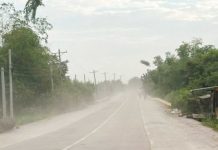ILOILO City – From January 1 to May 25 this year, Western Visayas recorded a total of 3,192 dengue cases with eight deaths.
This is a 22-percent increase compared to the same period in 2023, which saw 2,606 cases and 14 deaths, data from the Department of Health (DOH) showed.
The dengue virus is spread to people through mosquito bites, and a person can be infected with dengue multiple times.
Dengue mosquitoes are day-biting and thrive and reproduce in clean, stagnant water.
The breakdown of the 3,192 cases is as follows:
* Aklan – 508 cases with one death
* Antique – 241 cases
* Capiz – 426 cases with one death
* Guimaras – 169 cases
* Iloilo Province – 1,018 cases with three deaths
* Iloilo City – 222 cases
* Negros Occidental – 457 cases with three deaths
* Bacolod City – 151 cases
“Majority of cases were from the province of Iloilo. Ages range from less than one year old to 98 years old, with a median age of 17 years old,” according DOH-6 in a statement.
The age group with the most cases is between one to 10 years old, and the majority of cases are male, accounting for 54 percent.
For comparison, dengue cases from January 1 to May 25 last year were:
* Aklan – 452 cases with four deaths
* Antique – 215 cases
* Capiz – 227 cases with one death
* Guimaras – 67 cases
* Iloilo Province – 661 cases with one death
* Iloilo City – 279 cases with three deaths
* Negros Occidental – 552 cases with three deaths
* Bacolod City – 203 cases with two deaths
Dengue Awareness Month
This June, marked as Dengue Awareness Month, DOH-6 is strengthening its advocacy and information dissemination, especially as the rainy season begins.
Dengue can be life-threatening and typically manifests with a sudden high fever reaching 104 degrees Fahrenheit, accompanied by at least two of the following symptoms: severe headache, persistent nausea or vomiting, swollen glands, muscle and joint pains, pain behind the eyes, and red spots or patches on the skin.
“To stop the spread, adhere to the 5S strategy against dengue. Search and destroy mosquito breeding sites. Secure self-protection measures. Seek early consultation. Support fogging in hotspot areas. Sustain hydration,” advised DOH-6./PN





